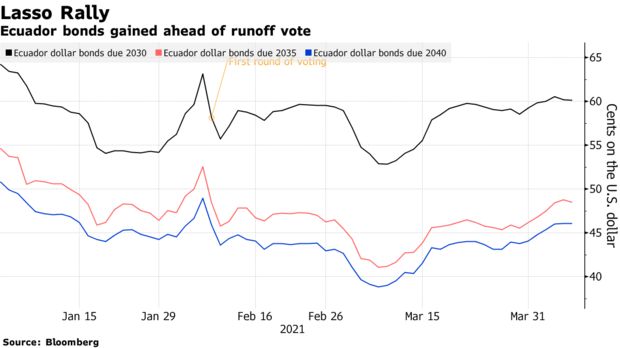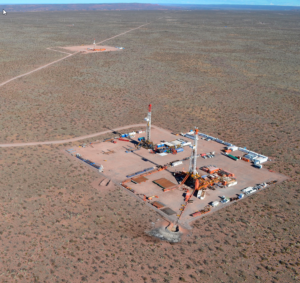
(Bloomberg, 11.Apr.2021) — Ecuadorean bonds rallied after career banker Guillermo Lasso won the presidential election with a late surge in support, reassuring investors in the default-prone country and shoring up U.S. ties.
Lasso beat out economist Andres Arauz, a left-wing protege of former President Rafael Correa, by a clear margin in Sunday’s runoff vote. Arauz, who conceded defeat, won February’s first round by 13 percentage points.
Lasso, 65, a self-made millionaire and father of five, has vowed to uphold a $6.5 billion financing agreement with the International Monetary Fund and to keep up payments on the country’s overseas bonds. In his victory speech on Sunday evening, Lasso said he will work to create “the prosperity we all long for.”
Investors welcomed the result, driving Ecuadorean 2030 bonds 13 cents higher to 73 cents on the U.S. dollar, the biggest price jump since they were restructured last year.
“Lasso’s victory should reduce political uncertainty and raise the prospects of a fairly orthodox and market-friendly macro policy agenda being pursued in coming years,” Goldman Sachs Group Inc. analyst Tiago Severo wrote in a note.
Lasso’s comfortable win will likely be a catalyst for bonds to rally more, according to a report by Goldman.

Ecuador’s southern neighbor Peru also held presidential elections on Sunday, with exit polls suggesting a messy runoff after no candidate got near the threshold needed for a first-round win.
With some 99% of votes counted in Ecuador, Lasso had 52.4% to 47.6% for Arauz, whose ties to former president Correa had raised the prospect of a return to an era of fiscal largess.
The campaign for control of Ecuador, an oil exporter and world-leading producer of bananas, shrimp and the balsa wood crucial for wind-turbine rotors, has implications beyond is borders.
Arauz, 36, who pledged to use central bank reserves to pay poor families, had been expected to strengthen ties with left-leaning governments in the region including in Cuba, Mexico, Venezuela and Argentina. Lasso’s win represents more of a focus on ties with Washington, and with U.S.-aligned governments in countries such as Chile, Colombia and Brazil.
Sigh of Relief
While bond investors breathed a sigh of relief, Lasso won’t have an easy time running the country of 17 million people which is far behind in its vaccination campaign and reeling from the economic impact of the pandemic. Last year the dollarized economy contracted 7.8%, its worst performance since at least the 1970s.
To govern successfully, Lasso will have to establish a working relationship with the National Assembly, where his backers hold just 31 of the 137 seats. He will also need to reach out to the more than 1.8 million Ecuadorians who voided their votes, including many from indigenous movements.
Lasso will find it tough to implement unpopular economic policies since legislators from other parties will be reluctant to spend their political capital on his behalf, said Maria Jose Calderon, political scientist at the Pontifical Catholic University in Quito.
Creating Jobs
“I’m just hoping the job doesn’t end up too big for Lasso,” given his lack of a majority in the next legislature, said Maria Paz Jervis, dean of law and social studies at SEK University in Quito.
The president-elect has said he’ll promote policies that boost investment and private sector job creation, and will phase out a tax on taking money out of the country. He’s also promised to boost the monthly minimum wage to $500 from $400, and oversee the vaccination of 9 million people against Covid-19 during his first 100 days in office.
Even if Lasso encounters challenges in implementing his political agenda, it will be easier for him and the IMF to find a middle ground in negotiations, according to Nathalie Marshik, head of emerging-market sovereign research at Stifel Nicolaus & Co. in New York. She expects a big rebound for Ecuador’s bonds.
“There will a lot more buyers than sellers,” Marshik said.
____________________
By Stephan Kueffner and Aline Oyamada. With assistance by Philip Brian Tabuas, Ben Bartenstein, and Sydney Maki

